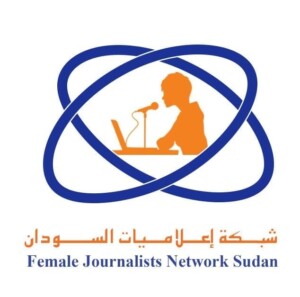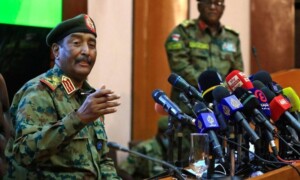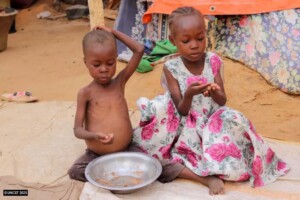Sudan PM Hamdok: ‘No place to hide’ from accountability
Prime Minister Abdallah Hamdok took aim at the Sudanese military over its vast economic activities yesterday, which he says should be limited to the defence sector, during a speech on the anniversary of the beginning of the revolution which overthrew the country’s former regime under Omar Al Bashir.
 PM Hamdok does an interview on Sudan TV on November 29 (Social media)
PM Hamdok does an interview on Sudan TV on November 29 (Social media)
Prime Minister Abdallah Hamdok took aim at the Sudanese military over its vast economic activities yesterday, which he says should be limited to the defence sector, during a speech on the anniversary of the beginning of the revolution which overthrew the country’s former regime under Omar Al Bashir.
“In today's world, there is no place to hide,” he said on Monday evening. He went on to explain that financial transparency and accountability of companies that exist in relation to the government and the military is a basic and imperative requirement, as it is not possible to manage the resources of the Sudanese people without it.
“Every army in the world invests in defence companies,” said Hamdok, “but it is unacceptable for the military and security services to do so in productive sectors, and thus compete with the private sector,” referring to entire sectors of Sudan’s economy which are dominated by companies controlled by senior military and paramilitary Rapid Support Forces (RSF) officials.
He also stated that discussions between various political partners of the transitional period in choosing ministers for the new government “have gone a long way,” and recognized the achievements of the revolution which led to the three-year transition to civilian governance in Sudan.
“Every army in the world invests in defence companies, but it is unacceptable for the military and security services to do so in productive sectors, and thus compete with the private sector."
– Abdallah Hamdok
The speech was made after the US officially removed Sudan from the list of State Sponsors of Terrorism, and also follows the passing of the Sudan Democratic Transition, Accountability, and Fiscal Transparency Act of 2020 by the US House of Representatives last week.
Hamdok said that “the US administration is working with us in complete harmony,” adding that Sudanese people were never terrorists and did not sponsor terrorism.
Nonetheless, removal from the list will bring “many great benefits,” according to the former economist, including opening up the country to investment and the global banking system, wiping the country’s external debt, stimulating local investment, and improving communication with Sudanese diaspora.
On the topic of normalising relations with Israel, he said that the Legislative Council are set to present the issue of normalization and discuss its approval.
On Monday, Finance Minister, Heba Mohamed, announced that the US will give a $1 billion bridge loan to the World Bank to help clear Sudan’s arrears with the institution.
The change could in turn “open the door” to more than $1.5 billion in annual development assistance from the International Development Association (IDA), a support deal that also provides an estimated amount of wheat and other materials for a period of 4 years, she said.
Sudan is currently $1.3 billion in arrears to the International Monetary Fund (IMF) and external debt is almost $60 billion.

Regarding his visit to Ethiopia, Hamdok said it was ‘‘very successful’’ and that there were a number of important developments.
The prime minister visited Ethiopia briefly on Sunday with an offer to broker a ceasefire in its northern Tigray region according to Sudanese government officials. Hamdok left from Addis Ababa airport a few hours after his arrival, after “discussing all urgent issues and common concerns” with Ethiopian Prime Minister, Abiy Ahmed.
This included Ethiopia's acceptance of the East African Intergovernmental Authority on Development (IGAD) mediation and agreement to attend the emergency summit of IGAD countries that will be held in Djibouti next week.
Sudan will resume negotiations with Ethiopia and Egypt over the Grand Ethiopian Renaissance Dam (GERD), which have been stalling for months and ground to a halt in November after Sudan pulled out of the latest round of talks.
The two countries also agreed to negotiate the countries’ borders and to activate a boundary committee between the two countries, said Hamdok. The first meeting of these new negotiations will be held in Khartoum.
Medical sector
On COVID-19, Hamdok stressed the continuing need to adhere to strict precautionary measures such as wearing masks and social distancing during his speech.
Regarding the Specialists' Representatives, Hamdok said that he has created 2,500 jobs and has sought to fully address the training and employment of doctors. In Omdurman, emergency doctors went on strike in August to protest work contracts.
Radio Dabanga’s editorial independence means that we can continue to provide factual updates about political developments to Sudanese and international actors, educate people about how to avoid outbreaks of infectious diseases, and provide a window to the world for those in all corners of Sudan. Support Radio Dabanga for as little as €2.50, the equivalent of a cup of coffee.












 and then
and then